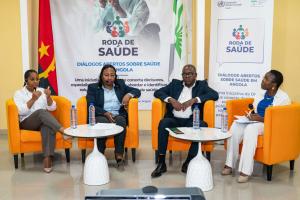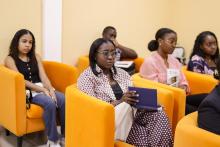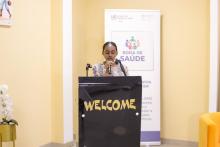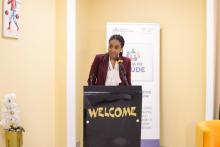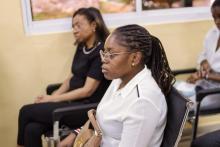Angola joins global call to put newborn and child safety at the heart of health systems
When she was just 9 years old, Rossana Francisco lost her mother, a nurse by profession. It was a painful moment that changed her life forever. That day, she promised to follow in her mother’s footsteps and dedicate her life to caring for others.
Today, at 26, Rossana is completing her nursing degree at the Private University of Angola (UPRA). After five years of dedication to her studies, she is currently interning in the gynecology and obstetrics department at Luanda General Hospital. “I feel fulfilled when I assist in a delivery and help ensure that newborns receive their first care,” she says.
It was at university that she heard about the Health Circle, an initiative of the World Health Organization (WHO) in Angola in partnership with UPRA that brings together decision-makers, experts, and the public to discuss challenges and solutions to health issues. By participating in the third edition, Rossana saw an opportunity to deepen her knowledge of patient safety, with a focus on newborns and children.
The event was held under the theme “Patient safety from birth!” with the aim of mobilizing health professionals, families, educators, and civil society to reduce risks and prevent avoidable harm in pediatric care.
“Every child has the right to be born and grow up safely. Ensuring error-free pediatric care is not only a clinical priority but a social and human commitment,” said Dr. Natércia de Almeida, WHO Officer for Sexual, Reproductive, Maternal, Neonatal, Child, Adolescent Health, and Nutrition in Angola.
During the debate, challenges such as the lack of resources, the overload of services, and the need to strengthen the continuing education of health professionals were discussed. Good practices were also shared, ranging from safety protocols in neonatal units to the active involvement of parents and caregivers.
Rossana left the meeting feeling more confident and ready to apply her acquired knowledge: “I learned that safety is not just about avoiding mistakes. It is also about listening to parents, involving families, and ensuring that every child receives dignified and humane care.”
The experience of young people like Rossana shows the impact of the Health Circle, which is not only a space for debate but also a practical tool for strengthening skills and preparing the next generation of professionals who will protect lives from birth.
With this third edition, the initiative reaffirms its role as a bridge between experts, institutions, and citizens, aligning Angola with the WHO’s global call to place the safety of newborns and children at the center of health systems as part of the path to achieving Sustainable Development Goal 3- Good Health and Well-Being for All.
